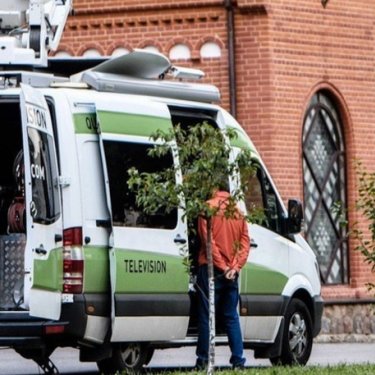Russian specialists fill gaps left in Belarusian state broadcaster

Reporters Without Borders (RSF) condemns the use of “Russian specialists” to replace employees who resigned from the Belarusian state TV and radio broadcaster BT after a strike in support of nearly month-old protests against fraudulent presidential election results. They are being used to maintain strict control over the state media, RSF said.
The Russian TV broadcaster RT (the former Russia Today) was warmly thanked for its help by President Alexander Lukashenko on 1 September. “Russian specialists” began replacing employees at BT the day after the strike began on 17 August.
Around 300 BT employees participated in the strike and a hundred or so resigned in support of the protesters. Other state-owned TV channels, Stalitsa, ONT and STV, have also been hit by these departures. The lack of cameramen, editors and IT specialists has paralysed the news channels.
BT producer Alyona Martinovskaya said she was prevented from working on 19 August, after expressing support for the protests, and was replaced by Russian workers. These “specialists” are reportedly working in TV newsrooms, handling production, editing and transmission. Lukashenko himself confirmed on 21 August that “two or three groups of Russian journalists” had been invited to help Belarusian TV channels.
This is also what BT employees have told the Russian daily RBC on condition of anonymity. The first RT team was seen on 18 August and consisted of five technicians and IT specialists, plus Konstantin Prydybaylo, a former BT employee who is now an RT correspondent in Belarus. The team returned to Russia a few days later but was immediately replaced by another.
The close links between RT and BT can even be seen in the content broadcast since the start of the strike. BT often uses video shot by the RT team based in Minsk, and prefers studio interviews with Russian and Ukrainian “experts” to actual news coverage, according to an analysis by the Belarusian consultancy Sense Analytics.
“Former BT chief Gennady Davydko said on 27 August that ‘state media are working to stabilize the situation and foreign media are working to destabilize it,’ but a double-standard applies to the Russian teams who have come to prop up the government’s propaganda,” said Jeanne Cavelier, the head of RSF’s Eastern Europe and Central Asia desk. “These strike breakers are broadcasting biased content with new techniques, and are refusing to provide objective coverage of the developments taking place in Belarus.”
Ruled since 1994 by Lukashenko, who has been reelected in the first round every five years, Belarus is ranked 153rd out of 180 countries in RSF’s 2020 World Press Freedom Index.



